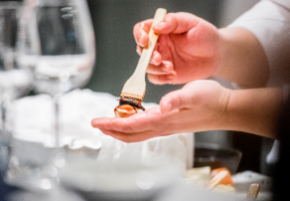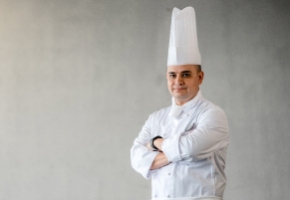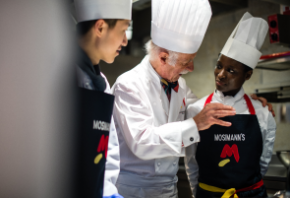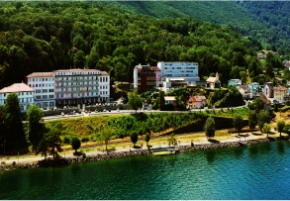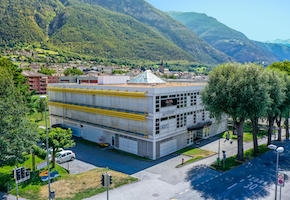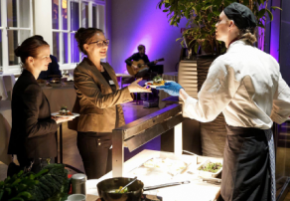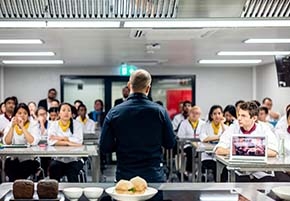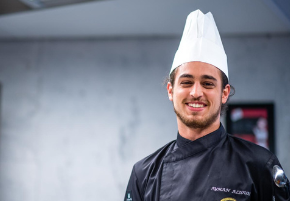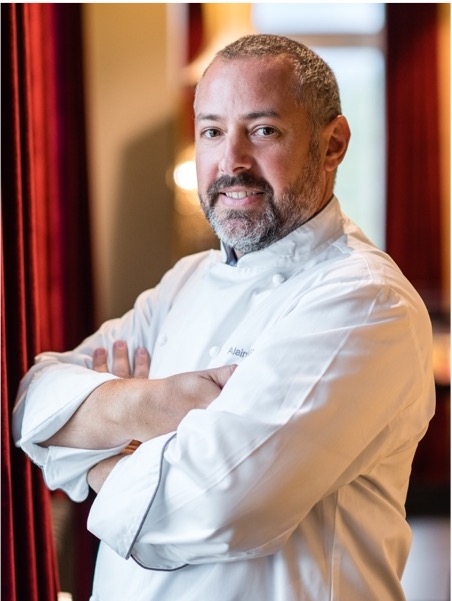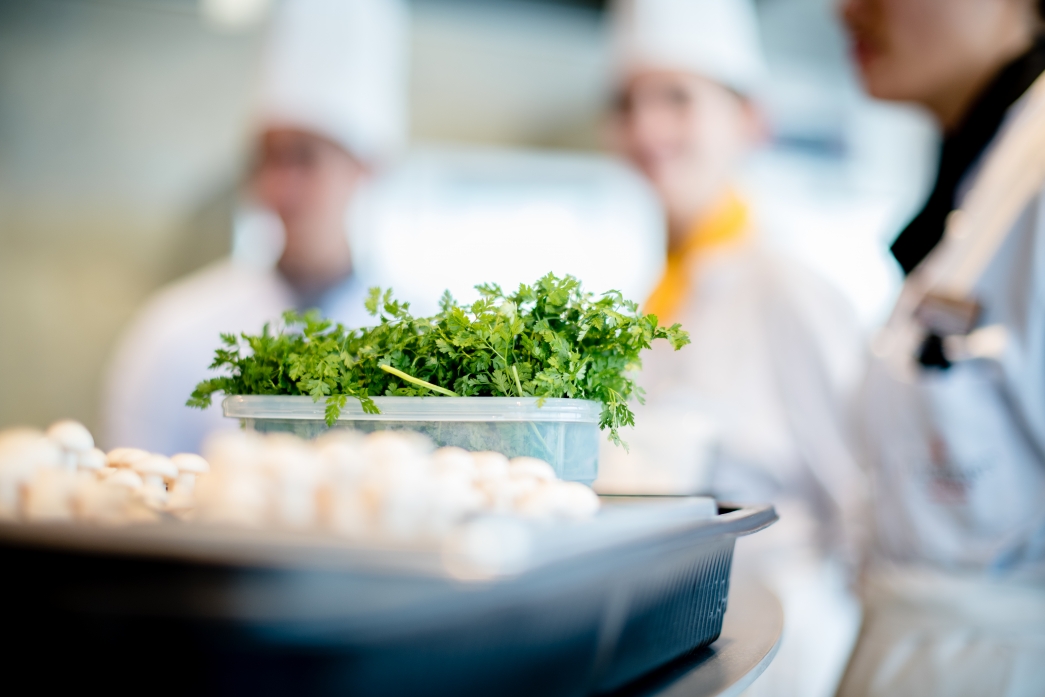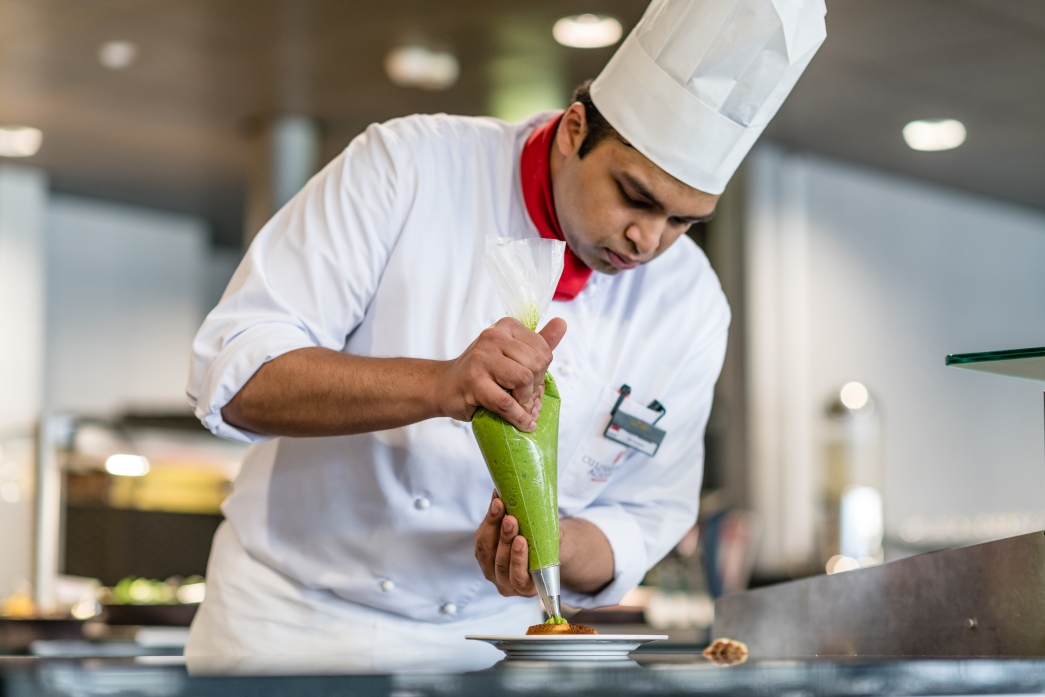- About
- Programs
- Campus Life
- Career Services
- Admissions
- News & Events
- Alumni
Change is on the menu – get ahead with our vegetarian program
Culinary Arts Academy assistant dean Alain Müller talks sustainability, health, the importance of provenance, and why joining the school’s vegetarian program could be the best thing you do for your career, and the planet
Long-term vegetarians will be all too familiar with the scenario: you’re shown to your table, take your seat and unfold the menu you’ve been excited to get stuck into for weeks, only to discover that there are just two unimaginative, uninspiring vegetarian options. Most likely, they’re loaded with cheese, which, hey, you’re not necessarily mad about, but you can’t just eat cheese all the time, as much as you’d like to. You feel disheartened and ignored.
For years, they were the forgotten at the wedding, the dreaded unexpected dinner guest, or worst of all, the ‘quirky’ friend, but now vegetarians are thankfully much better catered for – and growing in numbers. Chalk it up to education, an ethical judgement or simply an acute awareness of the seriousness of the climate crisis we find ourselves in, but people are eating differently, whether that be committing to a plant-based diet, or just cutting down on meat.
“The culinary world has always been constantly changing – and very rapidly at that,” recognizes Culinary Arts Academy assistant dean Alain Müller. “But now that we’re also faced with a global pandemic, and all the problems that come with it, change will be even more of a key word in the industry.
Alain Müller, assistant dean at Culinary Arts Academy
“Chefs have already started becoming more and more sustainable and customers are more informed on what they eat and very critical of how and where it’s sourced. This means that the food industry must adapt and evolve, and be able to offer diversity and cope with special dietary requirements.”
There are so many benefits to adopting a plant-based diet, it’s no surprise that people are taking a hard look at their eating habits. The culinary industry must be ready for them, says Mr. Müller, and not just for the sake of business. Luckily, Culinary Arts Academy is on the case.
“I personally think that for too long we’ve been over-consuming animal proteins, and this has led to an increase in proteins of less good quality and, thus, the use of hormones, medication and genetically-manipulated food,” Mr. Müller notes. “Over-production and cheaper costs have also led to lower quality meats and, in return, alongside the ethical concerns, this has really impacted what and how people choose to eat.
Students learn to master a wide range of plant-based ingredients
“As such, this is why we are seeing more and more people adopting plant-based diets. I’ve noticed this trend at Culinary Arts Academy, too – students are very critical of what they eat and the quality of the food they prepare. For years, we have always catered to various allergies, and religious and vegetarian diets, but this is unprecedented. It’s an awakening.”
Want to be part of the solution, not the problem? Put the academy’s Swiss Grand Diploma in Vegetarian Culinary Arts program on your watch-list.
Students are very critical of what they eat and the quality of the food they prepare. For years, we have always catered to various allergies, and religious and vegetarian diets, but this is unprecedented. It’s an awakening.
“At Culinary Arts Academy, we’ve always taken vegetarian and vegan diets into account, in both our practical and theoretical modules,” says Mr. Müller. “But with a lack of relevant expertise in today’s industry, we saw a gap and launched a six-month vegetarian program, with a focus on vegan pastry.
“The next intake is in July 2022, and will give chefs the chance to learn all about plant-based diets and develop their practical skills when it comes to the preparation and presentation of exclusively vegetarian and vegan dishes.”
A student prepares a beautifully-presented dish
And this program isn’t about slathering veggies in cheese and simply replacing the meat. There are no shortcuts at Culinary Arts Academy, and vegetarian cuisine gets the same gourmet treatment as any other.
“The program delves into the essentials of vegetarian cooking and helps you gain an understanding of its development, as well as the influence of other dietary requirements,” Mr. Müller explains. “You’ll be exposed to various techniques, and come to master the main base ingredients, such as vegetables, legumes, starches, nuts, mycoproteins, fungi and grains.
“You’ll explore the world of soy products as well, in order to make your own tofu, and will learn about international vegetarian cooking, super foods, healthy breakfasts, fast food and how to create creative and tasty plant-based dishes. Along with this practical module, students will also learn about nutrition and food safety and the philosophy around plant-based diet.
Studying vegetarian cuisine can open up career avenues you never knew were possible
“In the second half of the program, you’ll apply your skills to fine dining experiences,” Mr. Müller continues. “The principles and techniques of preparation are a little different, so you’ll level up your learning and tackle issues related to the cultural and historical aspects of vegetarian eating practices. You’ll get laboratory experience, and class trips will take you and your fellow students to vegetarian restaurants and markets. Of course, you’ll also explore the concepts of sustainability, zero waste production and environmentally-friendly thinking.”
If you’ve more of a sweet tooth, you’ll be glad to know it’s not just vegetables you’ll be focusing on either.
The principles and techniques of preparation are a little different, so you’ll level up your learning and tackle issues related to the cultural and historical aspects of vegetarian eating practices.
“You’ll also learn the basics of vegan sweets, pastries and desserts, as well as contemporary approaches to creative plant-based dessert-making,” Mr. Müller adds. “You’ll create plated vegan desserts for fine dining, with a key focus on aesthetics, styling and presentation.
“All in all, it’ll leave you a leader, a chef of tomorrow, and give you the tools you need to forge the future of food.”
Hungry for more? Find out more about the Swiss Grand Diploma in Vegetarian Culinary Arts and join us in July 2022.
#Academics
